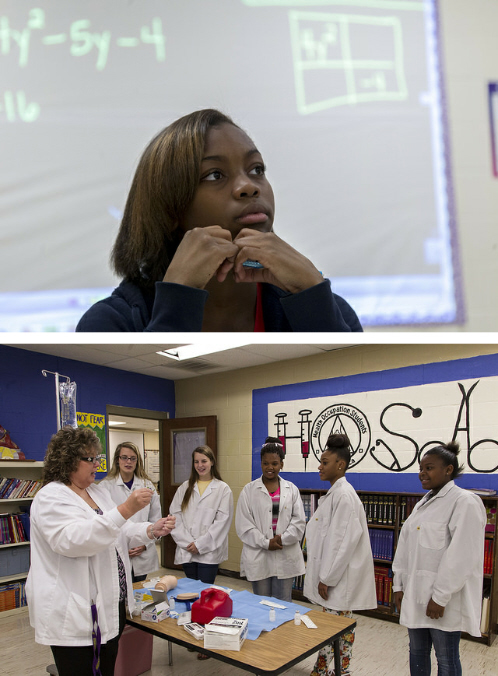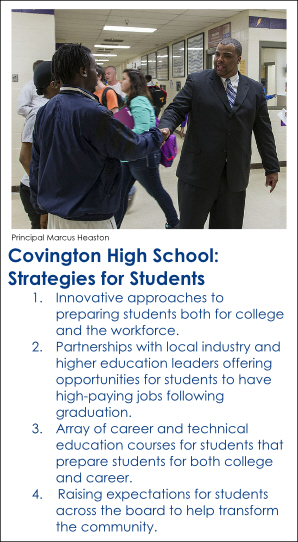Three out of four Covington High School graduates go on to a two- or four-year college after high school. That’s an impressive achievement, exceeding the statewide average.
But flip this point of pride upside-down, and for Principal Marcus Heaston, a challenge is revealed. What happens to the other kids?
2014 SCORE Prize winner Covington High School delivers results for every student, whether that means pairing qualifying kids with funds for college or paving direct pathways from high school to high-quality jobs.
“If we’re operating as a high-level high school, we need to make sure kids truly are college- and career-ready,” said Mr. Heaston. “We can end a generation of poverty if we do this the right way.”
 CHS serves 750 students in grades 9-12 in Covington, a small town northeast of Memphis. About 72 percent of CHS students are economically disadvantaged. The school has achieved strong three-year TVAAS growth, especially in Algebra I and II and English II. CHS has raised proficiency in algebra above the state average while narrowing achievement gaps.
CHS serves 750 students in grades 9-12 in Covington, a small town northeast of Memphis. About 72 percent of CHS students are economically disadvantaged. The school has achieved strong three-year TVAAS growth, especially in Algebra I and II and English II. CHS has raised proficiency in algebra above the state average while narrowing achievement gaps.
To ensure students are truly ready for college and career, CHS reaches out to the community and collaborates with local businesses and economic development initiatives. The school is enterprising in its preparation of students for available pathways to post-secondary schools and career training. Career and technical education classes help students acquire relevant skills in high school, particularly in the health services and manufacturing industries. A partnership with the Regional Economic Development Institute (REDI) helps students get to college with financial aid applications, and later, tracks college success rates. Expanded dual-credit options are offered, and students are prepared proactively to qualify for Hope Scholarship funds and programs like Tennessee Scholars and Tennessee Promise.
“Every time Governor Haslam comes up with an initiative, we study it. We find a way to really embrace it,” Mr. Heaston said.
In the last few years, CHS has found ways to partner with one of Tipton County’s largest employers, the Unilever manufacturing plant in Covington. Unilever is a massive manufacuturer of consumer goods, and in Covington, Unilever makes ice cream – Popsicles, Klondike and Good Humor bars, and Breyers. Almost 1,000 workers are expected to be on the team there by the time a current, major expansion is complete.
The plant expansion has created a need for more skilled entry-level workers than managers could find locally, said Marques Young, a Unilever maintenance manager and liaison to CHS. They’ve travelled as far away as St. Louis to make hires.
 Mr. Young, a CHS alumnus, said discussion of this problem with Mr. Heaston led to a “perfect synergy of time, place, and need.” Now CHS and Unilever have partnered in several meaningful ways for students, including through a unique course delivered in collaboration with Dyersburg State Community College (DSCC). The course offers a select group of students a direct pipeline to job opportunities with Unilever after completing high school, delivered through classes that provide skills and certifications desired by other manufacturers as well. Everyone wins, said Mr. Young.
Mr. Young, a CHS alumnus, said discussion of this problem with Mr. Heaston led to a “perfect synergy of time, place, and need.” Now CHS and Unilever have partnered in several meaningful ways for students, including through a unique course delivered in collaboration with Dyersburg State Community College (DSCC). The course offers a select group of students a direct pipeline to job opportunities with Unilever after completing high school, delivered through classes that provide skills and certifications desired by other manufacturers as well. Everyone wins, said Mr. Young.
“We’re creating a good, solid pipeline of talent,” Mr. Heaston said. “Students have every potential career path available, from marketing and accounting to front line supervision. The entire supply chain network has many opportunities. It all comes back to exposure. If you’re not exposed to it, you don’t know it exists.”
The four-module Certified Production Technician course, developed and delivered in full partnership with Unilever, offers students at CHS and other area high schools internship opportunities and experience with equipment used by Unilever. After graduation, students are qualified for jobs offering significantly higher wages and better benefits than a high school diploma alone could earn elsewhere, said Philip Newman, a DSCC instructor of the course.
“We can find jobs for them, because companies are hunting,” Mr. Newman said.
The program served 15 students in its first year, and 30 students in its second, the 2014-15 school year. Students qualify for the course based on their scores on the National Career Readiness Certificate (NCRC) exam, a required step for many jobs in the manufacturing sector. This school year, 91 CHS students took the test in hopes of scoring high enough secure one of the seats in next year’s program.
Concrete opportunities with Unilever are bringing out the best in CHS students, according to CHS teacher and instructional coach Cory Concus. Teens recognize that the wages and growth opportunities offered by manufacturers could provide a good living. Knowing the steps needed to get there spurs them to work hard. The best candidates for the program at this point aren’t the high achievers planning on college, or the lowest achievers who lack academic skills needed to qualify for the program. The kids being reached are “the very best of the middle,” a tough group to target, said Mr. Concus.
“You see an upping of expectations for kids in that middle range, that group that was falling by the wayside,” Mr. Concus said. “When a lot of these kids graduate, there’s not a lot of hope for them going forward. They want a future just like you want a future for them. When they succeed, people start to really believe in the kids again.”
Mr. Concus’s hope: Other industries adopt this model. Students benefit from attainable, rewarding goals, and employers benefit from hiring trained, proven workers. And in the long run, west Tennessee develops a high-skilled workforce drawing more employers to the area.
“I hope other industries see this and think that it’s a good, repeatable idea. This kind of thing works,” Mr. Concus said.
Fighting poverty, rebuilding the middle class – all in a day’s work at Covington High.
Learn more about Covington High’s work to raise student achievement in this SCORE Prize video shot at the school.
